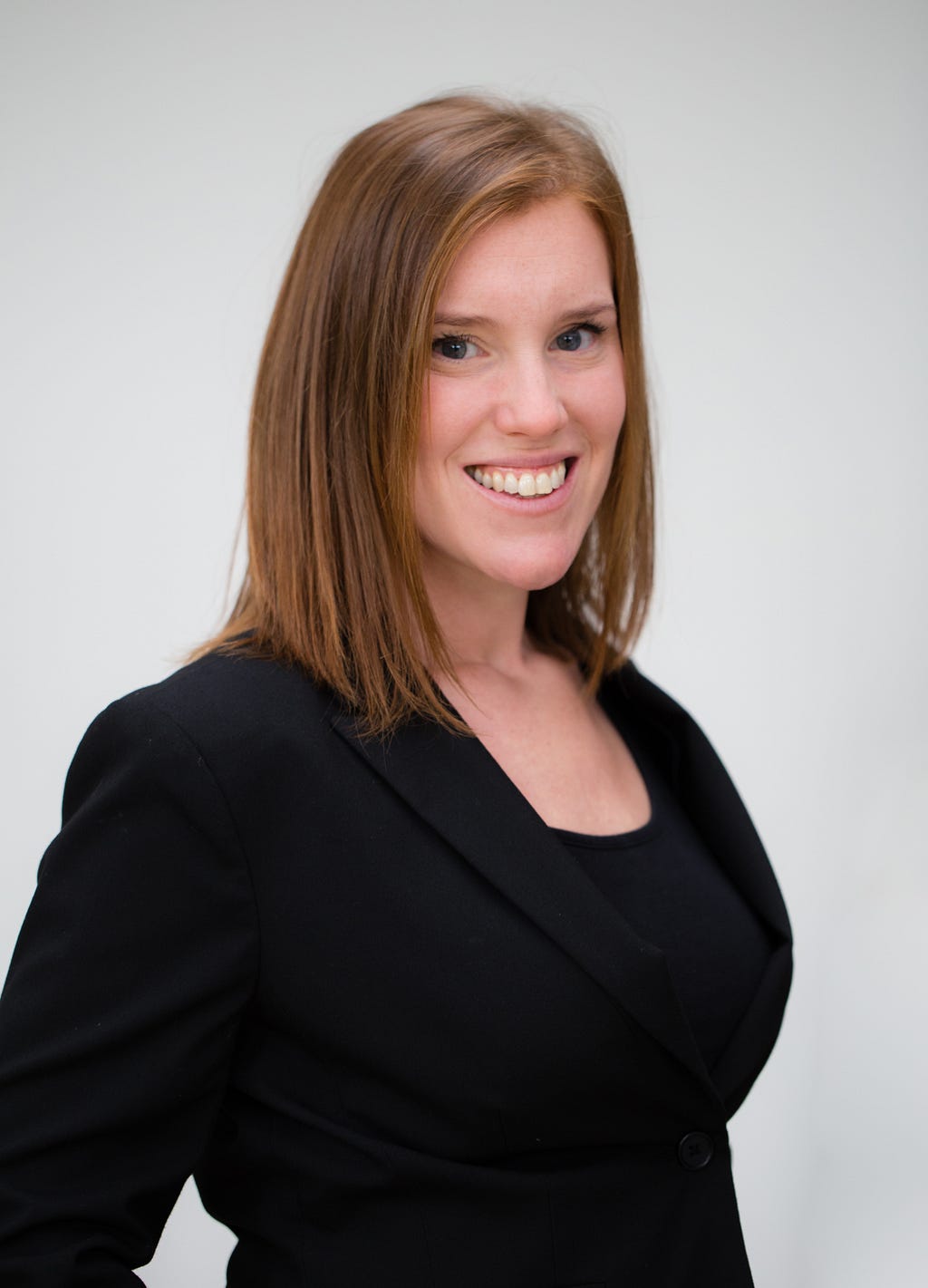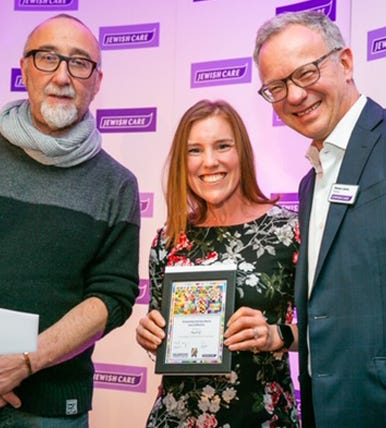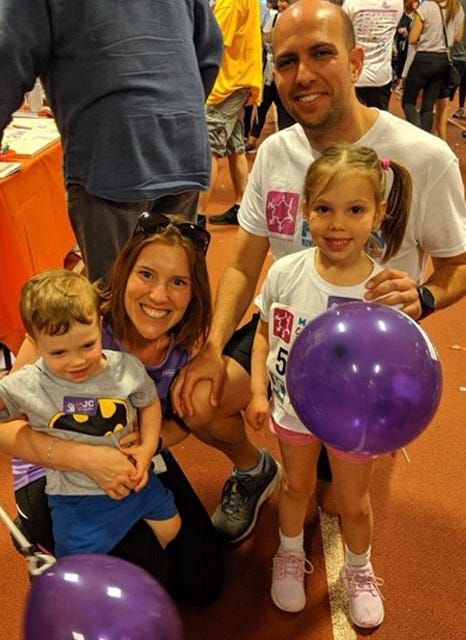
Stop congratulating men for doing things women do all the time. I recently saw a post on LinkedIn by a man applauding his lawyer for moving a meeting as he had to take his kids to school. The post received 20,000 likes on LinkedIn. 20,000 likes for a parent doing the school run! If I had a penny for every meeting I have moved to do the school run I would be able to retire! It’s become a cliché, but it’s true that women have two jobs — they have the emotional labour at home as well as going to their work life, while men hold down just one job and ‘help’ at home.
As part of my series about “the five things we need to do to close the gender wage gap” I had the pleasure of interviewing Amy Woolf, Managing Partner of The Woolf Partnership in London. A seasoned executive search consultant, Woolf specializes in transforming the leadership of her clients. She has a keen understanding of the future of the workforce and how that shift impacts the talent her clients will need. Prior to launching The Woolf Partnership, she worked at KPMG where she created a direct search service to the Partner group and was responsible for the design and content of the highly successful C-Suite Leadership Programme. She previously specialized in Executive Search in the professional services, technology and financial services sectors across Europe and Asia. A staunch advocate for gender diversity, Woolf has been a member of women’s networks throughout her working life. She represented KPMG on the Women on the Wharf Steering Committee and sponsored the creation of the UJS Student Women’s Network. She also takes a keen interest in social care and is an active lay leader at Jewish Care. She studied at the University of Manchester and the University of Massachusetts, Amherst.
Thank you so much for joining us, Amy! Can you tell us the “backstory” that brought you to this career path?
I grew up in executive search and I loved the opportunity to work with people. I loved understanding what motivates people, what drives them and finding ways to enable people to get the most out their careers. Similarly I thrived on understanding the heartbeat of an organisation and finding the best talent for my clients.
In 2011 I moved to KPMG to help set up an in-house direct search function, a great challenge which I enjoyed thoroughly. What the role offered me, more than anything, was the chance to be part of a large, Big Four consulting business and truly grasp what it meant to work within Professional Services. I took the chance to spend time in different areas of the organisation, and was privileged to have a place on the inclusion team. It was in that role where I started to uncover the complexity of the talent pipeline and the disparity in the gender pay gap. I had intended to be with KPMG for nine months, but ended up staying for almost a decade. It was a challenging and incredibly insightful time, learning each day. I was fortunate to work with a business that supported me during two maternity leaves, two operations and a bereavement. In my final role with the firm I led a leadership programme for clients who were soon to be on the executive boards of their organisations. Our programme focused on allowing them to navigate a period of exponential growth and understand how to turn challenges and obstacles into opportunities for their businesses.
I always knew I wanted to return to executive search, and when I took the decision to leave KPMG I knew that I needed to remain in the Transformation & Change arena. I wanted to help businesses find the talent to transform their leaderships that will enable them to thrive in the coming years. I also knew that I would be entering a world of responsibility. I have a responsibility to not only uncover the best talent, but also to make it as easy as possible for the most talented women to be matched up with the most innovative, exciting and forward thinking organisations.
Can you share the most interesting story that happened to you since you began this career?
In 2013 I was pregnant with my first child and very nervous about how motherhood would affect my career. I was entering an incredible new world in which I had no experience, and I wanted to fully immerse myself in it. Yet I also wanted to continue my career successfully. During this time, I was notified that I had been nominated by Brummell Magazine to its annual 30 under 40 Ones to Watch list, which celebrates the performance and achievement of young talent in London’s financial services sector and allied fields. It was a real landmark moment for me, to be recognised for the work I had been doing at this exact moment in my life, particularly as I had never thought I was doing anything particularly exceptional. I remember that when I saw the photograph of myself six-and-a-half months pregnant, my first thought was “I look so pregnant!” But when I look back now, I’m proud of both the recognition and of my role as an expectant parent.

Can you share a story about the funniest or most interesting mistake you made when you were first starting? Can you tell us what lesson you learned from that?
I’ve always been ambitious and tenacious. Years ago, I was on an eleven-and-a-half hour flight home from Africa and happened to be seated next to a guy I wanted to bring in as a client. It represented a huge piece of business and I was so focused on developing that relationship, keeping the conversation going for most of that long flight. I succeeded in getting his business card and the promise that we would meet — after he got some much-needed sleep. The meeting went well, and we got the business. But the elation of this success was undermined seriously by the comment of my boss, who remarked that some guys would do anything to get the attention of a pretty girl. That demeaning, and now that I realise it, incorrect, response has stayed with me over the years, and influenced how I interact with men in business situations to this day.
Ok let’s jump to the main focus of our interview. Even in 2019, women still earn about 80 cents for every dollar a man makes. Can you explain three of the main factors that are causing the wage gap?
First, I think that organisations still believe that their businesses are better run when a man is at the helm. It’s a cultural reality reflected in statements such as those that identify women who lead as female leaders while men are simply referred to as leaders.
Second, businesses don’t value experience equally. If a person takes time away from work to pursue a meaningful experience, they are generally praised. But when women take maternity leave, they have clearly ‘taken time out’. Organisations fail to realise the experience garnered from maternity leave and cannot diversify what success looks like.
Third, the performance and reward system is broken. We ask very different people with very different styles to perform, negotiate and demand more when this simply isn’t everyone’s natural habitat. From an early age boys and men are taught their voices are more valuable than those of girls and women. And then we expect women to be as confident navigating their performance reviews. It is an unjust system. They simply are not armed with the same tools in their armoury, yet they are in the same battle. These are realities that require a fundamental shift toward equality and transparency.
Can you share with our readers what your work is doing to help close the gender wage gap?
I am dedicated to a project aimed at attracting a strong talent pool of women and placing them in companies where I know they can thrive. Many of them have had to make the difficult decision to leave positions they love because they are exhausted with the effort of juggling home with work in situations that don’t allow for flexibility, the casual sexism in businesses and fighting against an Old Boys Club. A shining example is the famous ‘Mother Pukka’ in the UK; she needed just a fifteen-minute adjustment to her workday to allow her to pick up her child from daycare on time — fifteen minutes that she proposed to make up by coming in early. She was refused by her manager, and ended up leaving her job. These women who have turned to contracting but miss the permanent roles in high- performing teams deserve to be introduced to organisations that will value their experience and expertise.
I have also made the tough decision to refuse to take on certain clients when I am not confident that I am sending candidates into a positive environment. My work is based on building trusting relationships, and I won’t work with people that I cannot trust.
Ultimately, my goal in every search I undertake is to present a short list that represents the entire talent pool. I don’t seek out only women or only men or only certain nationalities. I want to find the best fit for the client and the candidate and that has to mean a diverse shortlist.
Can you recommend 5 things that need to be done on a broader societal level to close the gender wage gap. Please share a story or example for each.
1. In the UK we have good maternity AND paternity leave programs. New mothers typically take off up to 9 months after the child is born — with pay — and most large corporations offer fathers shared parental leave. So childcare for the first year could be covered. That’s the policy that has been fought so hard for, but unfortunately the uptake in enhanced paternity leave is painfully low. I believe that this policy should be enforced. If a business has taken up shared parental leave, men should be told to take it. This would gradually change the perception that men are somehow not as expendable as women. One instance where this has worked well is where a couple both earn around the same. In that case the mother took the first seven months off to be with their new baby and her husband started his paternity leave the week she went back to work. Both of them felt they had time with their children and neither felt they were compromising on their careers.
2. Make childcare more accessible and affordable. It’s so expensive that many women, especially if they don’t have family who can help, are forced to leave their jobs to become the full-time caregiver, or work for little to no money by the end of the month. It is hard to increase your salary if you are not even in the workplace and if they return to their roles years later, it stands to reason their renumeration would not have increased in their absence.
3. Change the process around renumeration and reward. This is a huge and fundamental issue and one which will take years to change, but the system is set up to create a gender pay gap. In a recent end-of-year appraisal amongst a senior leadership team that is largely comprised of women, every woman received their total year package and thanked their CEO. The remaining men on that SLT were the only ones to question their package and ask for more. If we allow for negotiation, there will always be a large proportion of the population that doesn’t ask for more. It is not the fault of women that they aren’t demanding (despite common misconception, they aren’t) it is the fault of the system. I once said everyone should receive training on how to manage their own performance review. That will help, in the interim, but the system needs to be more transparent, more open and fairer in order for us to truly reach gender parity.
4. Stop congratulating men for doing things women do all the time. I recently saw a post on LinkedIn by a man applauding his lawyer for moving a meeting as he had to take his kids to school. The post received 20,000 likes on LinkedIn. 20,000 likes for a parent doing the school run! If I had a penny for every meeting I have moved to do the school run I would be able to retire! It’s become a cliché, but it’s true that women have two jobs — they have the emotional labour at home as well as going to their work life, while men hold down just one job and ‘help’ at home.
5. Role Models. It is so simple and yet we haven’t quite cracked it. Once upon a time ago we were meant to look pretty, bake cakes and run homes. Then we were supposed to be masculine and impenetrable in our shoulder pads as we went to work. Now the perception is that we should look effortlessly wonderful whilst remaining in control, which is not always possible and something often has to give. I would love to see women’s vulnerabilities being embraced in the same way men’s are. When men admit to having mental health difficulties, they are applauded for their openness and honesty. When women admit to post-natal depression or anxiety, they are considered unstable. We need to rewrite this judgemental approach and recognize that it’s okay not to be okay all the time. The truth is that no one can truly have it all — neither men nor women. So let’s just embrace the knowledge that we don’t have to be perfect.

You are a person of great influence. If you could inspire a movement that would bring the most amount of good to the most amount of people, what would that be? You never know what your idea can trigger. 🙂
I would like to see companies adopt a four-and-a-half day work week for everyone. Working people simply don’t have enough time for themselves. I would like to see them explore who they are and what they want. That might mean going to a yoga class, going to a movie, reading a book, taking a self-help course or just getting outdoors. I believe that both the employees and the companies they work for would reap significant benefit from this recognition that people need to concentrate on their own well-being regularly.
Can you please give us your favorite “Life Lesson Quote”? Can you share how that was relevant to you in your life?
My most pertinent life lesson comes from my mum and has influenced everything I do in my life. She always told me and my siblings: “Don’t do anything by half measures, if you do something — do it properly.” It has taken me such a long time to learn I cannot do everything, but if I say yes to something, I do it thoroughly. I’m an all or nothing person. I give myself completely to whatever I’ve committed to. And I have my mum to thank for that.
We are very blessed that some of the biggest names in Business, VC funding, Sports, and Entertainment read this column. Is there a person in the world, or in the US whom you would love to have a private breakfast or lunch with, and why? He or she might see this, especially if we tag them. 🙂
I would love to meet Ruth Bader Ginsberg. I’ve been reading a book to my daughter that has stories about powerful women who have made or are making a difference in the world. RBG is one of the women included, and watching my daughter’s face whilst were reading was priceless. A true force of power and a wonderful role model.
This was really meaningful! Thank you so much for your time.
“5 Things We Need To Do To Close The Gender Wage Gap”, with Amy Woolf and Candice Georgiadis was originally published in Authority Magazine on Medium, where people are continuing the conversation by highlighting and responding to this story.

